|
|
|
Sort Order |
|
|
|
Items / Page
|
|
|
|
|
|
|
| Srl | Item |
| 1 |
ID:
102429
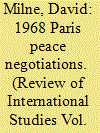

|
|
|
|
|
| Publication |
2011.
|
| Summary/Abstract |
This article draws on fresh archival research to challenge Robert Putnam's 'Two Level Game Theory'. In his seminal article, 'Diplomacy and Domestic Politics: The Logic of Two Level Games', published by International Organization in 1988, Putnam contended that international negotiations proceed at the domestic level and at the international level. In taking diplomatic initiatives forward, leaders are compelled to respond to the needs of domestic constituencies, through granting concessions and building coalitions, while international negotiations are pursued with one goal in mind: that any agreement will not damage the domestic political calculus. This article contends that Lyndon Johnson's actions in 1968 disprove this thesis. The President was in fact relaxed about a Richard Nixon victory in the general election as his commitment to defend South Vietnam from communism was stronger than that of his sitting Vice President, Hubert Humphrey. The President's concern for the fate of South Vietnam thus superseded his concern for his 'normal supporters'- the Democratic Party at large - who had become so hostile towards his management of the Vietnam War.
|
|
|
|
|
|
|
|
|
|
|
|
|
|
|
|
| 2 |
ID:
054357


|
|
|
| 3 |
ID:
182619


|
|
|
|
|
| Summary/Abstract |
A theoretical gap in the audience cost theory is the missing analysis of its central feature: the audience. This article defines the audience as a group composed of individuals and societal actors that can punish a government and pay attention to the issue being negotiated. Thus, the audience can vary depending on the issue salience. When the issue salience is low, the audience comprises just interest groups and the attentive public. Yet, the higher the issue salience, the more voters of the general public also become part of the audience. The audience’s composition in turn determines the level of the audience costs. Because the general public tends to evaluate national honor more highly, be less informed and have less well-defined preferences than interest groups and the attentive public, the audience costs should be higher when the issue salience is high. Furthermore, the audience can take actions that prevent the effect of audience costs or generate exogenous audience costs.
|
|
|
|
|
|
|
|
|
|
|
|
|
|
|
|
| 4 |
ID:
175923
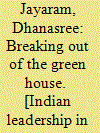

|
|
|
|
|
| Publication |
New Delhi, KW Publishers Pvt Ltd and CAPS, 2012.
|
| Description |
xxii, 235p.Hbk
|
| Standard Number |
9789381904138
|
|
|
|
|
|
|
|
|
|
|
|
Copies: C:1/I:0,R:0,Q:0
Circulation
| Accession# | Call# | Current Location | Status | Policy | Location |
| 059934 | 363.73874/JAY 059934 | Main | On Shelf | General | |
|
|
|
|
| 5 |
ID:
062592


|
|
|
| 6 |
ID:
082468
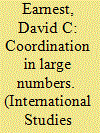

|
|
|
|
|
| Publication |
2008.
|
| Summary/Abstract |
How do states solve n-choice cooperation problems? Although classical game theory offers useful insights into how states achieve cooperation, its focus on equilibria means that it is largely silent on the processes of negotiation, particularly when multiple solutions to a cooperation problem exist. To explore the path histories of international cooperation, this article uses an agent-based model to explore how states solve a coordination game with three equilibria. To further enrich the analysis, the model explores how domestic constraints may affect coordination games. Such state-level constraints may present negotiators with considerable informational costs and high barriers to understanding each other's preferences. The model finds that the process of communicating preferences can greatly affect the prospects for cooperation, independent of distributional consequences and concerns about cheating. It also finds that, contrary to collective goods theory, a large number of states coordinate a solution to the problem easier than small groups. This is because larger groups create denser networks that communicate preferences more efficiently. The agent-based model thus illustrates how simulation as a method can challenge our extant thinking about cooperation among nation-states. These findings have implications for research on interstate coordination, since it suggests transnational linkages may help states overcome information barriers that frustrate agreements
|
|
|
|
|
|
|
|
|
|
|
|
|
|
|
|
| 7 |
ID:
090427


|
|
|
|
|
| Publication |
2009.
|
| Summary/Abstract |
The article posits that, over time, the sense of the World Trade Organization's so-called Single Undertaking has been perverted, and that the current interpretation requiring every WTO member to be obligated by all new Doha Round agreements is a major problem in the stalled negotiations. The authors' preliminary research supports the idea of conducting international trade negotiations in agriculture on the basis of a critical mass framework, where only those WTO members accounting for some nominated major percentage of trade would take on new obligations.
|
|
|
|
|
|
|
|
|
|
|
|
|
|
|
|
| 8 |
ID:
079341
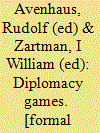

|
|
|
|
|
| Publication |
New York, Springer, 2007.
|
| Description |
xix, 348p.
|
| Standard Number |
9783540683032
|
|
|
|
|
|
|
|
|
|
|
|
Copies: C:1/I:0,R:0,Q:0
Circulation
| Accession# | Call# | Current Location | Status | Policy | Location |
| 052626 | 303.60151/AVE 052626 | Main | On Shelf | General | |
|
|
|
|
| 9 |
ID:
085418
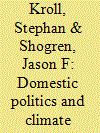

|
|
|
|
|
| Publication |
2008.
|
| Summary/Abstract |
We use the theory of two-level games to explore how domestic constraints affect the outcome of bargaining games over national contributions to an international public good such as global climate change, and to discuss the implications for the Schelling conjecture. We model the international negotiations on two dimensions-domestic and foreign contributions to the international public good-and extend the basic two-level model by examining a nonzero sum, two-dimensional conflict model on level one that includes characteristics of both conflict and cooperation. Our main results suggest that if the domestic game is a ratification game (as in the presidential system of the US), then contributions do not exceed those in a benchmark game without domestic constraints. But if the domestic game is an election game (which is more important in the parliamentary system of most continental-European countries), contributions can actually be higher than the benchmark.
|
|
|
|
|
|
|
|
|
|
|
|
|
|
|
|
| 10 |
ID:
117855
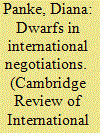

|
|
|
|
|
| Publication |
2012.
|
| Summary/Abstract |
Students of international relations interested in cooperation through international regimes and organizations very often devote their attention to the role of a few big states rather than the numerous small ones. Small states tend to possess fewer administrative and financial resources back home as well as smaller and less well-equipped delegations at the international negotiation table than big states. This can easily translate into difficulties in preparing positions for all items on the negotiation agenda and in developing negotiation strategies in great detail, which might inhibit small states from successfully influencing negotiation outcomes. Yet, since international negotiation often rest on a one-state, one-vote principle and since small states can adjust priorities and redirect their limited capacities, there is a window of opportunity for small states to turn into important international actors and achieve significant outcomes in international affairs. In order to systematically shed light on the role of small states in international negotiations, this article outlines the conceptual framework to answer the following question: How, and under which conditions, can small states successfully punch above their weight in international negotiations?
|
|
|
|
|
|
|
|
|
|
|
|
|
|
|
|
| 11 |
ID:
101618
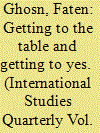

|
|
|
|
|
| Publication |
2010.
|
| Summary/Abstract |
This paper analyzes the conditions that encourage (or hinder) conflicting states in coming to the negotiating table. It also explores the factors that influence the successfulness of such negotiation attempts. A main argument of the paper is that it is important to look at what brings states to the table, because this may have a direct or indirect impact on the outcome of such negotiations. While confirming some of the findings within the conflict management literature, this paper demonstrates that contextual factors seem to have different effects or a different impact on each stage, implying that while certain factors may bring states to the table, they may not be the same factors that make agreements possible.
|
|
|
|
|
|
|
|
|
|
|
|
|
|
|
|
| 12 |
ID:
140271
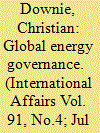

|
|
|
|
|
| Summary/Abstract |
It is widely accepted that the rising power of the BRIC countries—Brazil, Russia, India and China—has the potential to re-shape the international system. However, little attention has been given to the BRICs’ role in a growing area of strategic importance: global energy governance. While global governance scholars now argue that the international energy architecture requires substantive reform to keep pace with the rapid transformations in global energy markets, largely driven by the BRICs, it is not clear what role these countries will play in future governance arrangements. Drawing on recent scholarship in global governance and international negotiations, interviews with G20 energy officials, and the observations of the author, a past delegate to G20 negotiations, this article examines whether the BRICs as a coalition have the capacity and willingness to drive substantive global energy governance reform. In doing so, it highlights the problems with the BRICs as a coalition on energy and considers the prospects for energy reform in light of China's increasing engagement with energy governance ahead of it hosting the G20 Summit in 2016.
|
|
|
|
|
|
|
|
|
|
|
|
|
|
|
|
| 13 |
ID:
162385
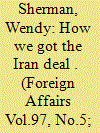

|
|
|
| 14 |
ID:
141253
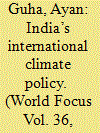

|
|
|
|
|
| Summary/Abstract |
India’s policy towards the issue of climate change at international negotiations seems to be equipped with both malleability and rigidity. There are certain aspects in which India’s international policy towards the issue has demonstrated significant capability to mould itself as per the changing dynamics of world politics. On the other hand, the core of the policy framework has shown considerable resistance to subject itself to modification and metamorphosis.
|
|
|
|
|
|
|
|
|
|
|
|
|
|
|
|
| 15 |
ID:
195556


|
|
|
|
|
| Publication |
Gurugram, HarperCollins Publishers, 2023.
|
| Description |
xviii, 278p.pbk
|
| Standard Number |
9789356999527
|
|
|
|
|
|
|
|
|
|
|
|
Copies: C:1/I:0,R:0,Q:0
Circulation
| Accession# | Call# | Current Location | Status | Policy | Location |
| 060600 | 327.54/KUM 060600 | Main | On Shelf | General | |
|
|
|
|
| 16 |
ID:
112131
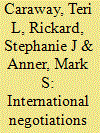

|
|
|
|
|
| Publication |
2012.
|
| Summary/Abstract |
What is the role of international organizations (IOs) in the formulation of domestic policy, and how much influence do citizens have in countries' negotiations with IOs? We examine these questions through a study of labor-related conditionality in International Monetary Fund (IMF) loans. Using new data from IMF loan documents for programs from 1980 to 2000, we test to see if citizens' economic interests influence IMF conditionality. We examine the substance of loan conditions and identify those that require liberalization in the country's domestic labor market or that have direct effects on employment, wages, and social benefits. We find evidence that democratic countries with stronger domestic labor receive less intrusive labor-related conditions in their IMF loan programs. We argue that governments concerned about workers' opposition to labor-related loan conditions negotiate with the IMF to minimize labor conditionality. We find that the IMF is responsive to domestic politics and citizens' interests.
|
|
|
|
|
|
|
|
|
|
|
|
|
|
|
|
| 17 |
ID:
133278
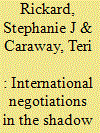

|
|
|
|
|
| Publication |
2014.
|
| Summary/Abstract |
This study examines the role elections play in negotiations between states and the International Monetary Fund (IMF). Although loans made by the IMF often require countries to introduce painful austerity measures that provoke a backlash from angry citizens, some governments are able to negotiate more favorable terms than others. Original data on the substantive content of IMF loans show that governments leverage imminent elections to obtain more lenient loan terms. Conditions that require labor market reforms in exchange for IMF financing are relatively less stringent in loans negotiated within six months before a pending democratic election, all else equal. The further away elections are from loan negotiations, the more stringent the labor conditions included in countries' loan programs. Elections give governments leverage in their international negotiations and this leverage is effective even when states negotiate with unelected bureaucrats during times of economic crisis.
|
|
|
|
|
|
|
|
|
|
|
|
|
|
|
|
| 18 |
ID:
135243
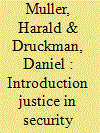

|
|
|
|
|
| Summary/Abstract |
This article provides an overview of this thematic issue. We discuss four issues about the role of justice claims in international relations (ir) scholarship: the discrepancy between the historical centrality of justice themes in political thought and empirical research in ir; challenges to the assumption of utility-maximizing motives; justice in the context of rules or norms of negotiation, and the rise of empirical research on justice in ir. We conclude with themes suggested by the contributing authors in this issue and suggest priorities for further research on justice in international negotiation.
|
|
|
|
|
|
|
|
|
|
|
|
|
|
|
|
| 19 |
ID:
124237
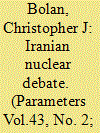

|
|
|
|
|
| Publication |
2013.
|
| Summary/Abstract |
Much of the public debate surrounding US policies regarding Iran has been distorted by myths that obscure the actual status of Iranian nuclear programs. Similarly, discussions about the implications of a nuclear-armed Iran are often built on questionable assumptions requiring more thorough examination. This article dispels these myths, questions these assumptions, and draws important implications for US policymakers in this critical strategic debate.
|
|
|
|
|
|
|
|
|
|
|
|
|
|
|
|
| 20 |
ID:
085409
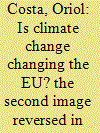

|
|
|
|
|
| Publication |
2008.
|
| Summary/Abstract |
The participation of the European Union (EU) in the international negotiations on climate change has attracted a significant share of scholarly attention. Climate change has certainly become a new dimension of European foreign policy and has enabled the EU to play a leadership role in the international arena. However, the relationship between the EU and the international climate regime is not a one-way street-while the EU has been active and decisive in shaping international negotiations, the latter have also had an impact on the EU. The international negotiations have influenced the EU's decision-making processes and internal negotiations-which has in turn influenced European integration itself. This article builds on the arguments of second image reversed analyses and proposes that there is a reciprocal relation between certain conditions of the EU-domestic setting and the international climate regime. The internal arrangements of the EU regarding climate change have maximized the influence of the regime and the very existence of the international negotiations has moulded these arrangements, making them more prone to external influence.
|
|
|
|
|
|
|
|
|
|
|
|
|
|
|
|
|
|
|
|
|